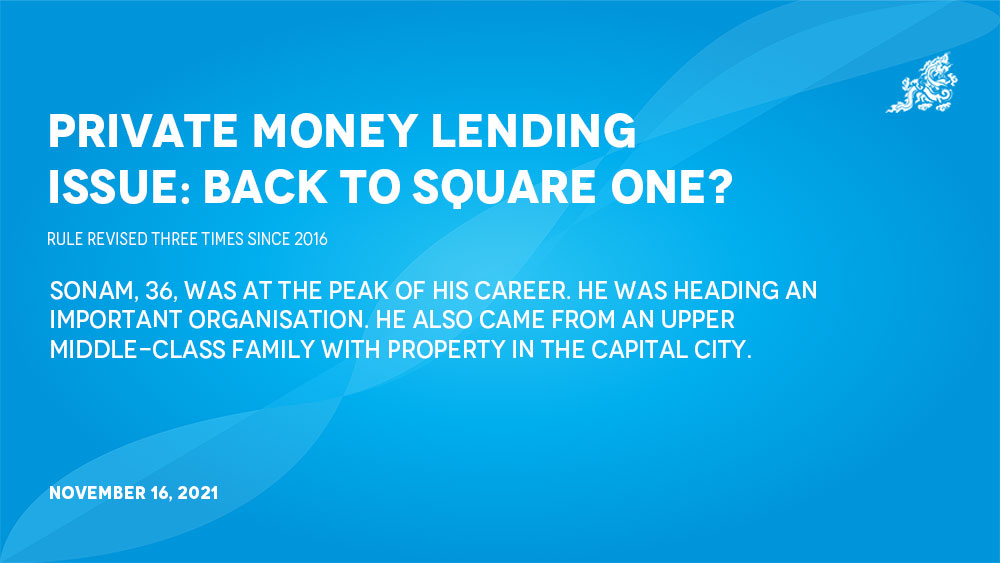Rule revised three times since 2016
Tashi Dema
Sonam, 36, was at the peak of his career. He was heading an important organisation. He also came from an upper middle-class family with property in the capital city.
What Sonam did not realise then was that his family was falling into debt.
While he was busy at work, often working late into the night, his wife got addicted to gambling, mortgaging the family’s properties for a few hundred thousand she borrowed from the so-called loan sharks.
“When I found out, it was too late. Moneylenders came to my house, threatening me with police arrest and court cases,” he said. “The money lenders never involved me when they lent the money, but when my wife could not repay it, they started bothering me.”
Sonam’s incident happened after the Royal Monetary Authority (RMA) and the judiciary came out with the Private Money Lending Rules and Regulations to address the social ills private money lending is causing in society. “I thought the rules and regulations would address a lot of problems that private money lending caused in society,” he said.
But today, only three money lenders are registered with the RMA. Courts, meanwhile, are filled with monetary cases, mostly related to private money lending.
“I never expected my family to be in this situation with regulations on the money lending business,” Sonam said.
“But the money lenders adapted and continued to operate with impunity. I say with impunity because I can only think of that as the reason why they are still thriving today.”
He said moneylenders don’t go around threatening or committing murder or overt violence, so their actions as not taken seriously. “In fact, many sympathise and incredulously appreciate and respect the lenders for their ability to make quick money.”
Many are of the view that private money lending is unethical, unproductive, and unregulated business that should not be encouraged. Moneylenders usually resort to psychological threats to extort money and property from the vulnerable. A borrower may be at fault when it comes to aspects of their financial situation, but a borrower is still the vulnerable one in this relationship. “Lenders don’t hesitate to lie, commit perjury, and use other deceptive practices to extort and seize their borrower’s property. This could one day lead to very dire consequences and we need to take more serious measures to bring this business under control,” Sonam said.
He also said the threats of police arrest and court cases, and the confidence borrowers displayed forced him to question the system that is supposed to protect people from those who break laws and exploit others’ vulnerabilities. “It’s very intimidating. It is only because our rules are not practical and precise enough to bring this business under control. I think if more of us speak out and discuss the consequences, we can achieve a more ethical and regulated money lending business.”
When the RMA decided to frame the Private Money Lending Rules and Regulations in 2016, it said private money lending businesses would be brought under its purview.
Today, more than five years after the rules and regulations came into effect and have been revised thrice, private money lending is still thriving.
The latest revision, PMLRR 2021, came into effect on November 1. But there is more confusion than clarity in the latest revision.
The PMLRR 2021 applies only to the three registered private moneylenders, and not to the illegal lenders in the market.
The new rules state that the judiciary may come up with a standard operating system (SOP) to deal with unregistered money lending cases, but it is not mandatory.
Going by the monetary cases the court deals with every day, illegal money lending is thriving. According to the Judiciary Report 2020, there were 1,674 monetary cases registered in the courts.
A judge from Thimphu dzongkhag court said data on monetary cases would indicate if the rules worked or not. He refused to elaborate on the issue.
Many family members of borrowers are hesitant to speak to the media openly, as it is a deeply private and stigmatised affair. “Moneylenders take advantage of this,” a close relative of a borrower said. “Those affected won’t feel free to provide constructive criticism, as they fear a ‘vindictive’ judicial system will punish borrowers even more harshly.”
A relative of a borrower alleged that the justice system may be inadvertently enabling private money lending rather than discouraging it. “Even after a money lender is exposed for perjury and other deceptive practises, it is usually only the borrower who is punished.”
He questioned why lenders are not punished. “Both parties should be punished if both are found guilty of having broken laws,” he said.
Another relative of a borrower said that while there are a few judges who look at money lending cases from a broader perspective, there are some that do not look beyond the agreements signed, and therefore usually rule in favour of money lenders.
She said money lenders are aware of this, and are therefore confident about bringing their cases to court repeatedly.
RMA officials, however, refuted the claims that the PMLRR has not served its purpose, and maintained that it deterred private moneylenders in the market.
An official explained that the PMLRR 2021 will ensure all parties are penalised for illegal private money lending. “Microfinancing facilities have increased since 2016 and many do not register with us.”
It was also claimed that most illegal private money lending happens in gambling dens where borrowers are willing to sign any fraudulent document and lenders take advantage of the situation.


